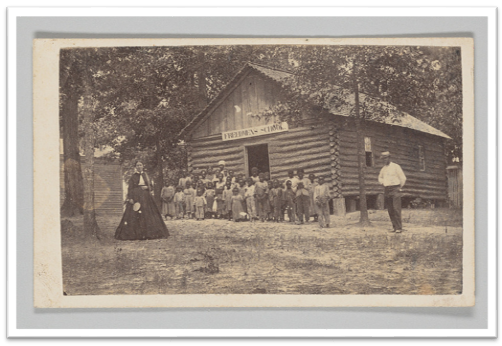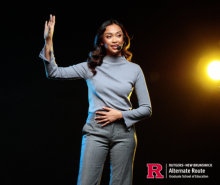There Should Be a TV Show Called "How to Get Away with Teaching"

During my classes last February, we watched a video that highlights the book, Fugitive Pedagogy, written by Dr. Jarvis Givens, Assistant Professor at the Harvard Graduate School of Education. The video provides an introduction to the term fugitive pedagogy coined by Dr. Givens which he defines as African-Americans' physical and intellectual acts that explicitly challenged antiblack protocols of educational domination; actions that often took place in discreet or partially concealed fashion. Dr. Jarvis' focus in the video is on the teacher and the textbook and how insurgent intellectuals use competing narratives of black life to offer a liberating educational experience in segregated black schools. Following the viewing, candidates in my classes, first-year teachers from diverse age groups and backgrounds, shared their impressions from the video. While their comments reflect a range of reactions, one commonality is that they each found the video compelling.
An Immediate observation from the candidates is that they had never heard of fugitive pedagogy and were stunned by the laws and practices they learned about while viewing the presentation. Candidates reflected on how history is taught, what’s deliberately omitted, and what they might do after learning about fugitive pedagogy.
- The fact that I haven’t heard of this before is what stands out to me though not surprising
- I was never even aware that textbooks for blacks existed, and I found it even more interesting that the most well-known ones were written by fugitive slaves. This is definitely something that has been missing from the narrative of our history and this perspective should be introduced.
- I appreciate the idea that history can and should be told from a different perspective. I think it is a good practice to help children understand that events happen from many different perspectives. Observing history through a different lens can help both students and teachers be more empathetic to others.
- I'm showing this video to my 11th graders for US II.
Many candidates saw parallels to their current teaching experiences where they creatively supplement the required curriculum to ensure students get what they need. They clearly understood the vast differences in the stakes for black teachers in the Jim Crow era who could be lynched for their teaching transgressions versus only being suspended or fired for similar subversive acts in the modern era.
- I loved the story of the brave teacher who was willing to risk being caught but also wanted to teach her children what she knew they needed. That feels like a struggle we still have today (although in a very different way) where the people who write the curriculum seem to know nothing about our kids and their needs.
- I found it interesting how Black education was forced to be subversive. It feels like today we sometimes have to be subversive with department heads, but to be subversive from essentially all of society is unimaginable.
- "Quiet calculated acts of resistance" and "masked display of complicity". Sometimes as teachers we have to do things to comply with requirements that are not developmentally appropriate or that don't fit what we know about our students and although we must comply, we can resist by adding or changing parts as needed so we can meet the needs of our students.
- For me, the image of a teacher hiding her textbook in her lap and doing drills with her administrator as to not get caught by a white administrator really illustrated just how much has not changed from the eras of slavery. We might tend to think that just because a law changes everything is magically fine but clearly, we need to take a deeper look if we haven’t already.
Some candidates thought about the larger issues related to our nation's evolution and the role that public policies play in advancing or stagnating growth in our country. They addressed curriculum, budgeting, and control while using what they learned during the presentation to situate the issues in a historical context.
- Learning about the realities that come with America being a racist country at the core it is interesting to see how white supremacist ideas have evolved overtime to outlawing certain subjects and deeming the schools “subpar” to requiring schools to perform well to earn their budgets which often, as we know today, keeps low income predominantly students of color schools from getting the same resources as other schools.
- The fugitive pedagogy, for Tessie McGee, was that, in a collective endeavor with the implicit support of the principal, she was teaching what she felt and knew had to be taught and what her students needed. This form of rebellion was not to challenge education, but to challenge the control of the state officials who wanted to maintain their control over black Americans even relatively long after the end of slavery.
- I just couldn’t imagine not being able to teach about your own history and having to hide it. It reminds me of all the discourse regarding teaching gender expression and critical race theory. Teachers are trying to incorporate these important topics in their curriculum, but those in charge won’t allow it.
One word that captures many candidates' reflections is inspired. Most teachers come to the education profession to make a difference, and that is no less true for alternate route candidates in our program. They draw upon the inspiring examples of their own teachers, many of whom influenced their decisions to join the teaching ranks. It was clear from their many comments that they were equally inspired by the courage and commitment displayed through fugitive pedagogy.
- One thing that stuck out to me was that there were so many people working to make sure that students were getting the best education that they could despite the roadblocks they had. I hadn't heard a lot of that information before.
- I think it was powerful to hear that these black educators were willing to risk so much to teach their students what they knew was valuable information the students needed to know regardless of what the administration was amazing. It made me think about the class conversation on how we need to be a little more willing to teach the students what they need to know and meet the students where they are.
- …the fact that runaway slaves used education to escape and continued their pursuit of knowledge and education. Then in turn they passed the knowledge on to others.
- Learning about the intrusiveness of whites on black educators was shocking. The ways that teachers worked around the systems to truly educate their students is inspirational.
- There should be a TV show called "How to Get away with Teaching."
Fugitive pedagogy occurred during a dark period in our nation's history, the period during enslavement through the Jim Crow era. Facing the truth about this historical period can be difficult particularly since the legacy of that era remains and its effects are palpable in our lives today. It's no wonder that several candidate responses revealed that they were deeply disturbed while learning about fugitive pedagogy.
- It absolutely sickens me that teachers had to teach in secret because it was unacceptable otherwise.
- The part about the flaunting of "Look at our schools we [ white people] made" really got me upset and it was unacceptable that they claimed it.
- The fact that I haven’t heard of this before is what stands out to me though not surprising
- The idea that I would have to hide anything that I’m teaching — anything that I know is the right thing to teach the right thing to do — is abhorrent to me. I can’t imagine teaching in a time when there was that much risk associated with this profession or being passionate enough about it to do it properly.
Finally, author and educator bell hooks warned about naming the pain or uncovering the pain in a context where it is not linked to strategies for resistance and transformation (1989). The comments of the candidates seeking to take action suggest an understanding of her advice. They express a commitment to advancing truth and helping students develop their critical consciousness even if all they do is expand student exposure to transformational and empowering content.
- The speaker defined “fugitive pedagogy” and contextualized it historically. It reminded me of how the most valuable way to approach our time in school and with our students is when we fight for truth despite forces around us that make it easier to lie to students and stakeholders than to help them discover truth.
- I always tell the students don’t obey for the sake of obeying. I teach in order to create original and critical thinkers. As a foreign language teacher, it is subversive to teach students to use the language for things they want to do.
- I'm showing this video to my 11th graders for US II.
Works cited:
HarvardBookStore. “Jarvis R. Givens Discusses ‘Fugitive Pedagogy’ with Joshua Bennett.” YouTube, YouTube, 7 May 2021, https://www.youtube.com/watch?v=N2ZRwyseLVI.
Hooks, Bell. Talking Back: Thinking Feminist, Thinking Black. South End Press, 1989.
If you’re considering following your dream of teaching, Rutgers Alternate Route can offer you the support and training you need to succeed. Be sure to follow Rutgers Alternate Route on Twitter or sign up for Alternate Route’s monthly newsletter for more information and stories from the field of education.

 Irene Hall, Ed.D., has over 30 years of teaching and school leadership experience. Founder of Discovery Charter in Newark, Dr. Hall earned her doctorate in Education from Harvard University and serves as an instructor with the Rutgers--CESP Alternate Route Teacher Training Program. She strongly believes in developing positive, respectful relationships with students and families, multi-age grouping, the mutuality of both discipline and creativity in the learning environment, and the necessity for educators'' subversive acts to meet their students' needs.
Irene Hall, Ed.D., has over 30 years of teaching and school leadership experience. Founder of Discovery Charter in Newark, Dr. Hall earned her doctorate in Education from Harvard University and serves as an instructor with the Rutgers--CESP Alternate Route Teacher Training Program. She strongly believes in developing positive, respectful relationships with students and families, multi-age grouping, the mutuality of both discipline and creativity in the learning environment, and the necessity for educators'' subversive acts to meet their students' needs.





